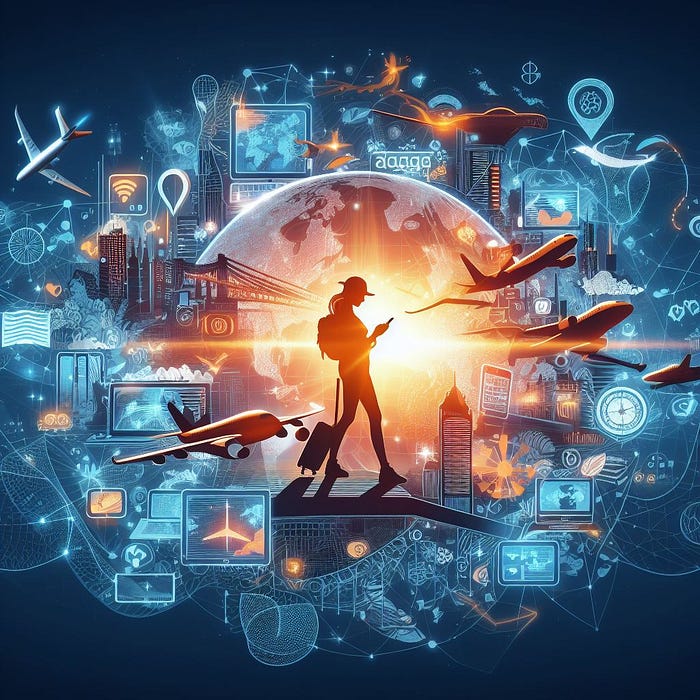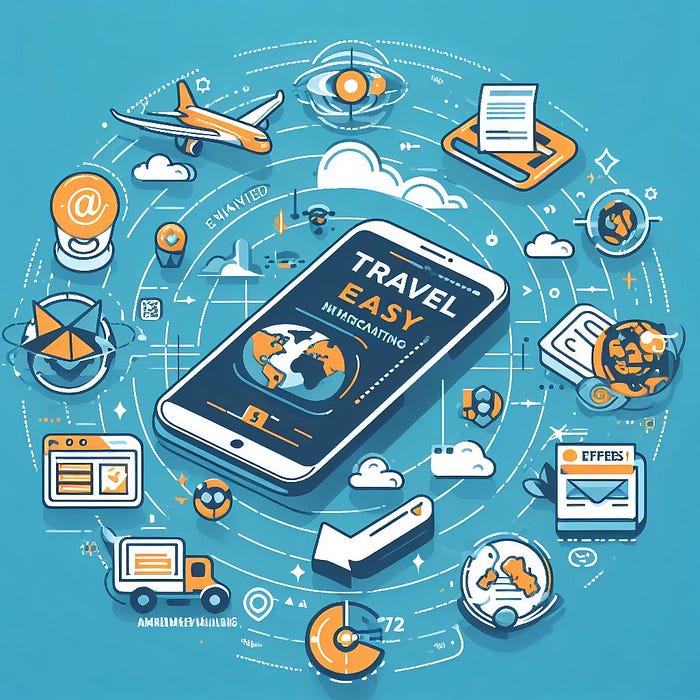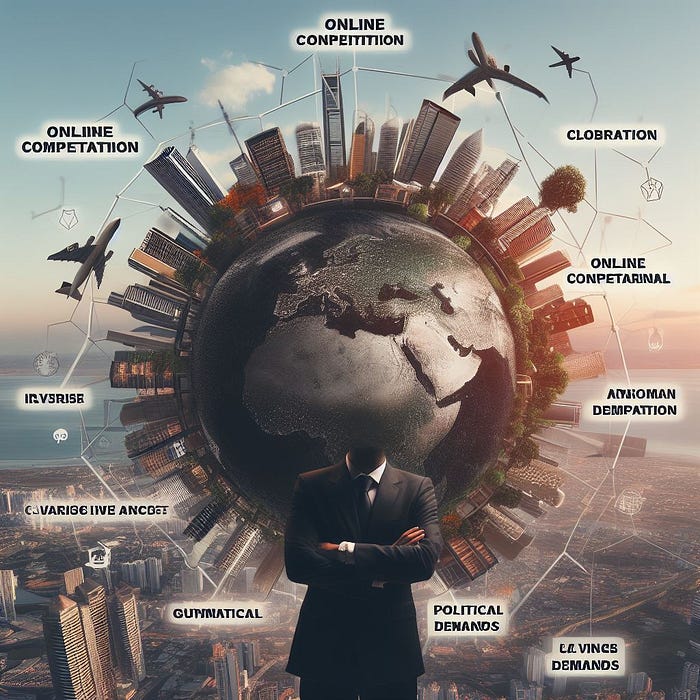
From Clicks to Adventure! How Technology Unleashed Wanderlust in the Digital Age?
In the 21st century, planning a vacation involves visiting a local travel agent or relying on guidebooks and word-of-mouth recommendations. However, the digital age has completely transformed the way we travel. Thanks to technological advancements and high-speed internet, travellers now have the freedom to book flights and hotels online, opt for unique accommodation options like staying in someone’s home through platforms like Airbnb, and access instant information through their mobile devices, like reading online reviews while connected to hotel Wi-Fi.
Says Tamara Lohan, co-founder and chief technology officer at boutique hotels website Mr & Mrs Smith. She emphasises that:
Companies like Airbnb are mainly credited with “encouraging younger people to explore sooner and in a more cost-effective way.” Thanks to technology, “travellers now have more choice and information, making it easier to explore the world.”
Embracing the Digital Frontier: Transforming Travel & Evolving Wanderlust
Digital technology has revolutionised the travel industry, completely changing how people plan, book, and experience journeys. The impact of digitalization has been far-reaching, driving innovation, growth, and globalisation in the tourism sector while redefining the essence of travel itself.
Online travel agencies (OTAs) like Booking and Expedia have emerged as influential players in the travel landscape, enabling travellers to book their travel services online independently. Meanwhile, platforms like TripAdvisor, offering reviews and booking options, have gained prominence due to the digital revolution.
Digital technology has also transformed the wanderlust concept and how people experience it. Our increasing interconnectedness across economies, cultures, languages, and borders has led travel to shape our worldview and how we perceive the world. Younger generations, in particular, prioritise experiences over material possessions, leading to a greater emphasis on enhancing the overall travel experience, from airports to destinations.
Rather than using travel as an opportunity to disconnect, young travellers embrace technology to enrich their experiences and stay connected and informed. A significant 84 percent of millennial travellers in the United States claim to have never used a physical travel agent, opting instead to leverage innovative travel solutions and curate their own experiences. The surge in travel-related apps and technologies caters to this growing demand, empowering tourists to overcome cultural, financial, and language barriers and engage more authentically and meaningfully with the world.
Emerging Profiles of Wanderlust-Driven Travellers:

- Eco-Conscious Explorers: Travellers with a solid commitment to environmental sustainability, prioritising eco-friendly accommodations, green transportation options, and responsible activities. The Global Sustainable Travel Report revealed that a significant 73% of global travellers have intentions to stay in eco-friendly lodgings at least once during their travels(read more)
- Nomadic Professionals: The Digital Nomads, a growing tribe of location-independent workers, seamlessly blend work and travel. They seek co-working spaces and long-term accommodation options to support their mobile lifestyle. In the United States alone, MBO Partners estimated there would be approximately 35 million digital nomads in 2023.
- Wellness Wanderers: The Wellness Seekers are travellers dedicated to enhancing their health and well-being during their journeys. They actively seek destinations and experiences that foster relaxation, rejuvenation, and self-care. According to the Global Wellness Institute, wellness tourism has experienced remarkable growth, expanding at an annual rate of 6.5%, more than twice the overall growth rate.
The Rise of Digital Travel Tools Empowering Wanderlust:
Digitalization has increased exponentially over the last three decades, encompassing various industries worldwide. The travel and tourism sector has undergone significant transformation due to the widespread adoption of digital technologies. A notable aspect of this shift is the emergence and growth of the online travel market, catering to the escalating demand for digital travel services. Prominent players in this market include online travel agencies (OTAs) such as Booking and Expedia, providing tourists with the convenience of autonomous online booking for travel services. Additionally, travel websites like Tripadvisor offer valuable reviews and a range of booking options for travellers.
The key benefits of a travel app for modern travel businesses

- Enhanced Marketing: Travel apps are powerful marketing tools, enabling modern travel businesses to gather valuable user data and design more focused and personalised marketing campaigns.
- Streamlined Check-ins: By incorporating digital check-ins, travel apps minimise the need for cumbersome paperwork, making the check-in process more manageable and less stressful for customers.
- Real-time Offers: Travel apps deliver the best offers and promotions directly to customers through push notifications, giving them real-time access to enticing deals and encouraging prompt bookings.
- Added Value Services: Many travel apps integrate with other service providers, such as taxi or train booking platforms, enriching the customer’s journey with added value and convenience. These integrations create a seamless travel experience, offering travellers an all-in-one solution for their transportation needs.
Simultaneously, modern consumers seek enhanced digital experiences during their travels. Virtual tours of desired destinations or accommodations have gained popularity, offering immersive previews of travel experiences. Moreover, mobile travel solutions, such as travel apps, have become indispensable tools for travellers, enabling them to explore new tourist attractions, check in to hotels, and access essential travel information on the go. According to Statista’s Digital Market Outlook, the global revenue generated by travel apps is projected to increase by an impressive 17 percent in 2023 compared to the previous year, reaching a staggering 400 million U.S. dollars. As this digital transformation continues to shape the travel industry, it revolutionises how people plan, experience, and cherish their adventures across the globe.
Social Media’s Impact on Travel Trends: Instagram, Wanderers, Influencers, and FOMO
In the digital age, wanderlust has been profoundly influenced by social media, particularly the Instagram effect, shaping our travel aspirations like never before. The rise of travel content creators, popularly known as influencers, has significantly impacted travel trends. Through captivating visuals and alluring narratives, these influencers entice wanderers to explore new destinations, seek unique experiences, and document their adventures for the world to see.
Social media platforms have become virtual travel guides, providing information, travel tips, and real-time updates from fellow travellers. However, this flood of attractive travel content on social media has also given rise to FOMO (Fear Of Missing Out), fostering an urgency for experiential travel. As travellers witness others’ exciting journeys online, they are driven to pursue equally thrilling experiences, thus fueling a never-ending quest for the next adventure.
While social media has undoubtedly enriched our travel inspirations and connected us to a global community of explorers, it is essential to balance the virtual allure with mindful and authentic travel experiences that truly resonate with our passions and desires.
The Power of Influencers and Social Media on Travel

Social media influencers have become a powerful driving force in the travel industry, especially among Gen Zers, with 45% relying on influencers’ travel recommendations. The captivating content these influencers share on social media is a major source of inspiration for travellers, with 86% expressing interest in visiting specific destinations after seeing their enticing images on their feeds.
This influence is powerful among luxury travellers, as 55% of them believe that documenting their journeys on social media enhances the significance of their experiences. Moreover, almost 40% of global luxury travellers plan to place even more importance on social media when planning their trips in the coming year. The impact of social media on travel decisions and experiences continues to skyrocket, fundamentally reshaping how travellers explore and connect with the world.
Travels Booking Revolution: Convenience, Challenges & Over Tourism
In the ever-evolving travel landscape, the Booking Revolution has been both a boon and a bane, redefining how we explore the world. Online Travel Agencies (OTAs) have undeniably brought convenience to our fingertips, enabling us to plan and book our dream getaways easily. Thanks to these platforms, the democratisation of travel has empowered wanderlust in individuals from all walks of life, making once unattainable destinations within reach. However, challenges have surfaced with the rise of the sharing economy exemplified by giants like Airbnb and Uber. While these platforms have unlocked unique travel experiences and income streams for hosts, concerns regarding tourism have cast a shadow on some popular destinations. The influx of tourists, driven by digital booking platforms, has placed immense pressure on local ecosystems, culture, and infrastructure.
Challenges Faced by Travel Agencies:

Upon discovering this fact, it becomes evident how rapidly the travel industry is expanding its reach. As the industry proliferates, it naturally invites increased competition, presenting numerous challenges for running and sustaining a successful travel business in a fiercely competitive landscape teeming with rivals. As an entrepreneur in this dynamic field, it is crucial to navigate the challenges and stay ahead of the competition by implementing innovative strategies, embracing technological advancements, and delivering exceptional services to meet the evolving needs of travellers.
- Strengthening Online Credibility: To thrive in the competitive travel industry, travel agents must build and maintain a credible online presence. More than a static website is required; it must be responsive and efficient in handling bookings and addressing client inquiries.
- Streamlining Booking Procedures: In the mobile-driven era, simplifying the booking process is crucial for customer convenience and satisfaction. Adopting an upgraded booking system and an intuitive dashboard for managing bookings is essential to stay ahead.
- Managing Influx of Enquiries: The rising demand in the travel industry leads to a flood of inquiries, posing challenges for travel agencies. Effectively streamlining inquiry management becomes essential to pay attention to important details and meeting customer expectations.
- Eliminating Duplicate Data Entries: Travel businesses often need to avoid duplicate data entries from various sources, creating inefficiencies in managing buyer personas. Implementing streamlined data management systems can prevent redundant work and enhance accuracy.
- Enhancing Operational Efficiency: Tedious operational management can overwhelm travel business owners. Improving operational efficiency through proper systems and processes ensures delightful and standardised services for customers.
Travels Booking Revolution Over Tourism:
The travel industry is undergoing a revolutionary transformation, driven by advancements in booking technologies and the rise of online travel platforms. The convenience and accessibility offered by these innovations have significantly impacted how travellers plan and book their journeys. However, this digital revolution has also raised a pressing concern — over tourism. As popular destinations face an overwhelming influx of tourists, the delicate balance between tourism and environmental sustainability is challenged. Addressing tourism requires collaboration between travel industry stakeholders, governments, and travellers. Sustainable travel practices, alternative destination promotion, and responsible tourism initiatives play a vital role in preserving the world’s natural and cultural treasures while ensuring that future generations can experience the wonders of travel.
Privacy in the Digital Landscape: Risks & Balancing Travel Memories
The digital landscape’s rapid growth has raised serious privacy concerns, especially with the widespread collection and utilisation of personal data through digital technologies. A thought-provoking article published in SpringerLink reveals that these mounting privacy concerns have shaken the relationships between consumers and companies, leading to shifts in regulatory interventions and individuals’ privacy-protective behaviours.
A recent Harvard Business Review article suggests that the past two decades have witnessed data management operating like the “wild west,” but now, a new era is dawning. Consumer mistrust, government actions, and intensified customer competition drive this transformation. Firms that derive value from personal data must adopt new acquisition approaches. This change is prompted by a convergence of factors, including consumer demands, government initiatives, and market forces, which collectively grant users more control over the data they generate.
Empowering Local Communities Through Technology:

Technology holds the transformative power to empower local communities while leaving a significant impact on a global scale. SafeTraces, through edible, invisible DNA-based barcodes on food products, aided the Tembé Indigenous People in Brazil to reclaim 15% of their land from illegal loggers.
Similarly, Digital Empowers is a collaborative platform for business and community leaders, co-creating solutions that shape the future of social impact innovation. These inspiring examples demonstrate how technology can drive positive change, benefiting local communities and the wider world.
Embracing the Future: Blockchain, AR, and Space Tourism
The future of travel is being redefined by a host of technological innovations that promise to revolutionise how we explore the world. One groundbreaking development is blockchain technology, which has entered the travel industry, bolstering security and trust in transactions. With its decentralised and transparent nature, blockchain ensures that travel data and financial transactions are protected from fraud and manipulation, instilling confidence among travellers and service providers.
Another exciting advancement is the integration of Augmented Reality (AR) into travel experiences. AR enhances exploration by overlaying digital elements onto real-world environments, transforming landmarks and attractions into interactive and immersive wonders. AR enriches the travel experience like never before, from virtual historical tours to interactive museum exhibits. As we venture into the future, the allure of space tourism beckons, promising an extraordinary frontier of travel beyond our planet. With the rapid pace of technological evolution, we can anticipate a future where travel becomes not just a journey but a transformative and awe-inspiring adventure into the unknown.

